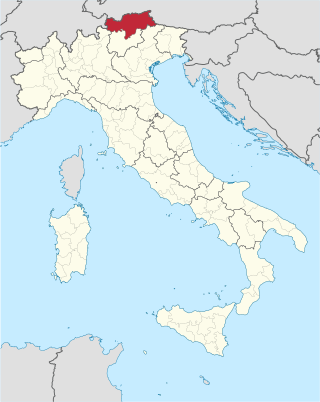
South Tyrol is an autonomous province in northern Italy. An English translation of the official German and Italian names could be the Autonomous Province of Bolzano – South Tyrol, reflecting the multilingualism and different naming conventions in the area. Together with the autonomous province of Trento, South Tyrol forms the autonomous region of Trentino-Alto Adige/Südtirol. The province is the northernmost of Italy, the second largest with an area of 7,400 square kilometres (2,857 sq mi), and has a total population of about 534,000 inhabitants as of 2021. Its capital and largest city is Bolzano.

Trentino-Alto Adige/Südtirol is an autonomous region of Italy, located in the northern part of the country. The region has a population of 1.1 million, of whom 62% speak Italian as their mother tongue, 30% speak South Tyrolean German and several foreign languages are spoken by immigrant communities. Since the 1970s, most legislative and administrative powers have been transferred to the two self-governing provinces that make up the region: the province of Trento, commonly known as Trentino, and the province of Bolzano, commonly known as South Tyrol. In South Tyrol, German remains the sizeable majority language.
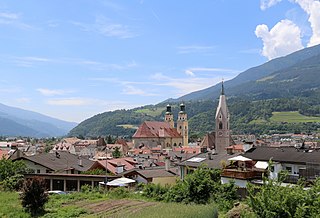
Brixen is a town and commune in South Tyrol, northern Italy, located about 40 kilometres (25 mi) north of Bolzano.
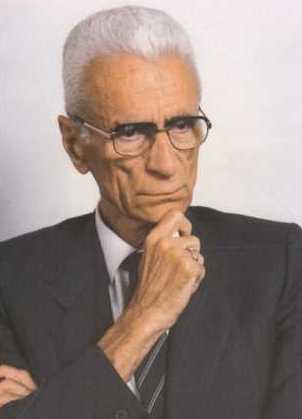
Silvius Magnago was a South Tyrolean politician who served as Chairman of the South Tyrolean People's Party from 1957 to 1991 and as Governor of South Tyrol from 1960 to 1989.

The Citizens' Union for South Tyrol, formerly Union for South Tyrol, was a national-conservative and, at times, right-wing populist political party active in South Tyrol, Italy.

The South Tyrol Option Agreement was an agreement in effect between 1939 and 1943, when the native German and Ladin-speaking people in South Tyrol and several other municipalities of northern Italy, which had belonged to Austria before WWI, were given the option of either emigrating to neighboring Nazi Germany or remaining in Fascist Italy, where the German minority was subjected to repressive Italianization efforts.
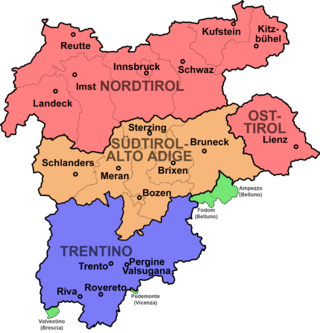
Modern-day South Tyrol, an autonomous Italian province created in 1948, was part of the Austro-Hungarian County of Tyrol until 1918. It was annexed by Italy following the defeat of the Central Powers in World War I. It has been part of a cross-border joint entity, the Euroregion Tyrol-South Tyrol-Trentino, since 2001.
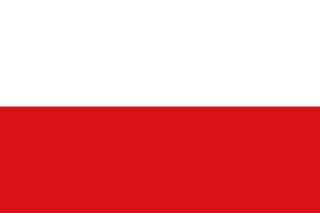
The (Princely) County of Tyrol was an estate of the Holy Roman Empire established about 1140. After 1253, it was ruled by the House of Gorizia and from 1363 by the House of Habsburg. In 1804, the County of Tyrol, unified with the secularised prince-bishoprics of Trent and Brixen, became a crown land of the Austrian Empire. From 1867, it was a Cisleithanian crown land of Austria-Hungary.
The South Tyrolean Liberation Committee was an underground secessionist and terrorist organisation founded by Sepp Kerschbaumer and several combatants including Georg Klotz in the mid-1950s which aimed to achieve the right for self-determination for South Tyrol and the related secession from Italy via bomb attacks.

The Social Progressive Party of South Tyrol was a regionalist social-democratic party of German speakers South Tyrol that was active from 1966 to 1978.
Rai Südtirol is an Italian free-to-air regional television channel owned by state-owned public broadcaster RAI – Radiotelevisione italiana and operated by RAI's South Tyrolean service. It is the company's German and Ladin languages television channel aimed at the German-speaking public of South Tyrol and the Ladin-speaking population of Ladinia. It was launched on 7 February 1966, it broadcast from its studios in Bolzano and unlike all other RAI channels, it carries no commercials.

In 1919, at the time of its annexation, the middle part of the County of Tyrol which is today called South Tyrol was inhabited by almost 90% German speakers. Under the 1939 South Tyrol Option Agreement, Adolf Hitler and Benito Mussolini determined the status of the German and Ladin (Rhaeto-Romanic) ethnic groups living in the region. They could emigrate to Germany, or stay in Italy and accept their complete Italianization. As a consequence of this, the society of South Tyrol was deeply riven. Those who wanted to stay, the so-called Dableiber, were condemned as traitors while those who left (Optanten) were defamed as Nazis. Because of the outbreak of World War II, this agreement was never fully implemented. Illegal Katakombenschulen were set up to teach children the German language.

The South Tyrol Alpine Club, abbreviated AVS, is an association of German and Ladin-speaking mountain climbers in South Tyrol, northern Italy. Founded in 1946, it is subdivided into 32 sections and 58 local divisions. The AVS is based in Bolzano and has more than 60,000 members.

Oskar Peterlini is an Italian political writer and Lecturer at the Free University of Bozen Bolzano.

Tyrol is a historical region in the Alps of Northern Italy and western Austria. The area was historically the core of the County of Tyrol, part of the Holy Roman Empire, Austrian Empire and Austria-Hungary, from its formation in the 12th century until 1919. In 1919, following World War I and the dissolution of Austria-Hungary, it was divided into two modern administrative parts through the Treaty of Saint-Germain-en-Laye:
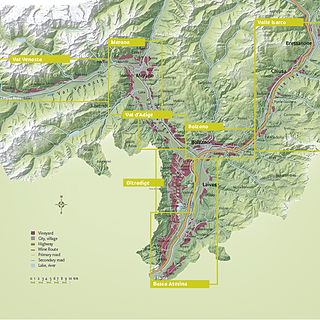
South Tyrol is an autonomous province located in northeast Italy producing wine. This Austro-Italian wine region is noted for the distinct Austrian influences on the wine industry, due to the region's long history under the rule of Austria-Hungary and Holy Roman Empires.

Polizeiregiment "Südtirol", later Bozen, and finally SS-Polizeiregiment "Bozen", was a military unit of the German Ordnungspolizei recruited in the largely ethnic-German Alto Adige region in north-east Italy in late 1943, during the de facto German annexation of the region. The ranks were ethnically German Italian draftees while officers and NCOs were Germans.
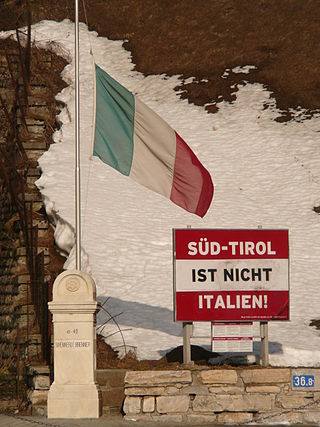
The South Tyrolean independence movement is a political movement in the Italian autonomous province of South Tyrol that calls for the secession of the region from Italy and its reunification with the State of Tyrol, Austria. Concurrently, some groups favor the establishment of an interim Free State of South Tyrol as a sovereign nation while reintegration is organized.
South Tyrolean German or Tyrolese is a dialect spoken in the northern Italian province of South Tyrol. It is generally considered to be a sub-variety of Southern Bavarian, and has many similarities with other South German languages, in particular with varieties of Austrian German. It may develop its own standard variety of German, though currently is linguistically heteronomous to German German.
The Deutscher Verband was a coalition of bourgeois German-speaking political parties that was formed in South Tyrol in 1919 after the region was annexed by Italy. It was a merger of the Catholic Tiroler Volkspartei and the national liberal Deutschfreiheitliche Partei. The German-speaking Social Democrats, for their part, joined with the Italian Socialist Party.
















